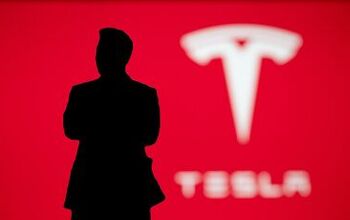Faraday Future Founder Files for Chapter 11

The founder of Faraday Future, Yueting Jia, has filed for bankruptcy and restructuring under Chapter 11 in the United States, according to a statement released by the company. The decision allows Jia (known within the company as “YT”) to address his debts in China, which can be measured billions, so his ownership of FF can be transferred to creditors.
Due to Faraday’s repeatedly broken promises and clandestine way of doing business, we’ve never had an overabundance of faith in the company. While that view hasn’t changed, the corporate statement frames Jia’s U.S. bankruptcy as a positive.
Jia is looking at a little over $2 billion in debts after deducting the value of frozen assets in China and guarantees on some convertible loans. Without them, it’s closer to $3.6 billion. In addition to the bankruptcy filing, Faraday wants to establish a “creditor trust” for the benefit of YT’s creditors. Once established, it will be jointly managed by a committee of creditors and trustee providing oversight.
From there, Jia plans to transfer all his existing equity interest in Smart King Limited, the global holding company for Faraday Future, to the creditor trust to better protect his creditors and repay his debts. While FF issued a more complete outline of its plan, there was also a shortlist of the most pertinent issues:
This Plan provides YT an opportunity to address his personal debts, help facilitate FF’s equity financing efforts and prepare for an IPO, and further advance the implementation of FF’s US-China dual home market strategy.
YT will continue to be involved with the FF team to complete its strategic goals in the capacity of FF’s founder and Chief Product & User Officer (CPUO) and to maximize the value of FF and the assets in the creditor trust. The Plan benefits all stakeholders.
This filing for restructuring will not affect the ownership of employee stock options or shares in FF acquired upon exercise of employee stock options. Employee stock options will remain an effective tool to help FF continuously assist in the recruitment of future talent.
Faraday says none of this will impact “normal business operations.” But that’s not saying much, considering the company’s stagnation over the last year. YT also has his debts split between over 100 different parties thanks to the total collapse of FF’s Chinese sister company LeEco — a company currently on the nation’s “debtor blacklist.” The restructuring aims to help settle outstanding debts and absolve Jia from all liabilities and outstanding claims.
In order for this plan to work, 90 percent of the organizations and individuals YT owes money to have to agree to the strategy by November 8th. It’s an all-or-nothing plan, with the fate of the company pretty much hanging in the balance. If everyone plays ball, Jia thinks he can repay any remaining debts and get the company back on track with an IPO. But that cannot happen with a bunch of Chinese debt mucking things up.
[Image: Faraday Future]

A staunch consumer advocate tracking industry trends and regulation. Before joining TTAC, Matt spent a decade working for marketing and research firms based in NYC. Clients included several of the world’s largest automakers, global tire brands, and aftermarket part suppliers. Dissatisfied with the corporate world and resentful of having to wear suits everyday, he pivoted to writing about cars. Since then, that man has become an ardent supporter of the right-to-repair movement, been interviewed on the auto industry by national radio broadcasts, driven more rental cars than anyone ever should, participated in amateur rallying events, and received the requisite minimum training as sanctioned by the SCCA. Handy with a wrench, Matt grew up surrounded by Detroit auto workers and managed to get a pizza delivery job before he was legally eligible. He later found himself driving box trucks through Manhattan, guaranteeing future sympathy for actual truckers. He continues to conduct research pertaining to the automotive sector as an independent contractor and has since moved back to his native Michigan, closer to where the cars are born. A contrarian, Matt claims to prefer understeer — stating that front and all-wheel drive vehicles cater best to his driving style.
More by Matt Posky
Latest Car Reviews
Read moreLatest Product Reviews
Read moreRecent Comments
- Joe65688619 I agree there should be more sedans, but recognize the trend. There's still a market for performance oriented-drivers. IMHO a low budget sedan will always be outsold by a low budget SUV. But a sports sedan, or a well executed mid-level sedan (the Accord and Camry) work. Smaller market for large sedans except I think for an older population. What I'm hoping to see is some consolidation across brands - the TLX for example is not selling well, but if it was offered only in the up-level configurations it would not be competing with it's Honda sibling. I know that makes the market smaller and niche, but that was the original purpose of the "luxury" brands - badge-engineering an existing platform at a relatively lower cost than a different car and sell it with a higher margin for buyers willing and able to pay for them. Also creates some "brand cachet." But smart buyers know that simple badging and slightly better interiors are usually not worth the cost. Put the innovative tech in the higher-end brands first, differentiate they drivetrain so it's "better" (the RDX sells well for Acura, same motor and tranmission, added turbo which makes a notable difference compared to the CRV). The sedan in many Western European countries is the "family car" as opposed to micro and compact crossovers (which still sell big, but can usually seat no more than a compact sedan).
- Jonathan IMO the hatchback sedans like the Audi A5 Sportback, the Kia Stinger, and the already gone Buick Sportback are the answer to SUVs. The A5 and the AWD version of the Stinger being the better overall option IMO. I drive the A5, and love the depth and size of the trunk space as well as the low lift over. I've yet to find anything I need to carry that I can't, although I admit I don't carry things like drywall, building materials, etc. However, add in the fun to drive handling characteristics, there's almost no SUV that compares.
- C-b65792653 I'm starting to wonder about Elon....again!!I see a parallel with Henry Ford who was the wealthiest industrialist at one time. Henry went off on a tangent with the peace ship for WWI, Ford TriMotor, invasive social engineering, etc. Once the economy went bad, the focus fell back to cars. Elon became one of the wealthiest industrialist in the 21st century. Then he went off with the space venture, boring holes in the ground venture, "X" (formerly Twitter), etc, etc, etc. Once Tesla hit a plateau and he realized his EVs were a commodity, he too is focused on his primary money making machine. Yet, I feel Elon is over reacting. Down sizing is the nature of the beast in the auto industry; you can't get around that. But hacking the Super Charger division is like cutting off your own leg. IIRC, GM and Ford were scheduled to sign on to the exclusive Tesla charging format. That would have doubled or tripled his charging opportunity. I wonder what those at the Renaissance Center and the Glass House are thinking now. As alluded to, there's blood in the water and other charging companies will fill the void. I believe other nations have standardized EV charging (EU & China). Elon had the chance to have his charging system as the default in North America. Now, he's dropped the ball. He's lost considerable influence on what the standardized format will eventually be. Tremendous opportunity lost. 🚗🚗🚗
- Tassos I never used winter tires, and the last two decades I am driving almost only rear wheel drive cars, half of them in MI. I always bought all season tires for them, but the diff between touring and non touring flavors never came up. Does it make even the smallest bit of difference? (I will not read the lengthy article because I believe it does not).
- Lou_BC ???


































Comments
Join the conversation
Man, and I wanted to join their development team. Luckily they never called me back.
This is the electric car future GM has to look forward to. In many ways it is Ponzi scheme.